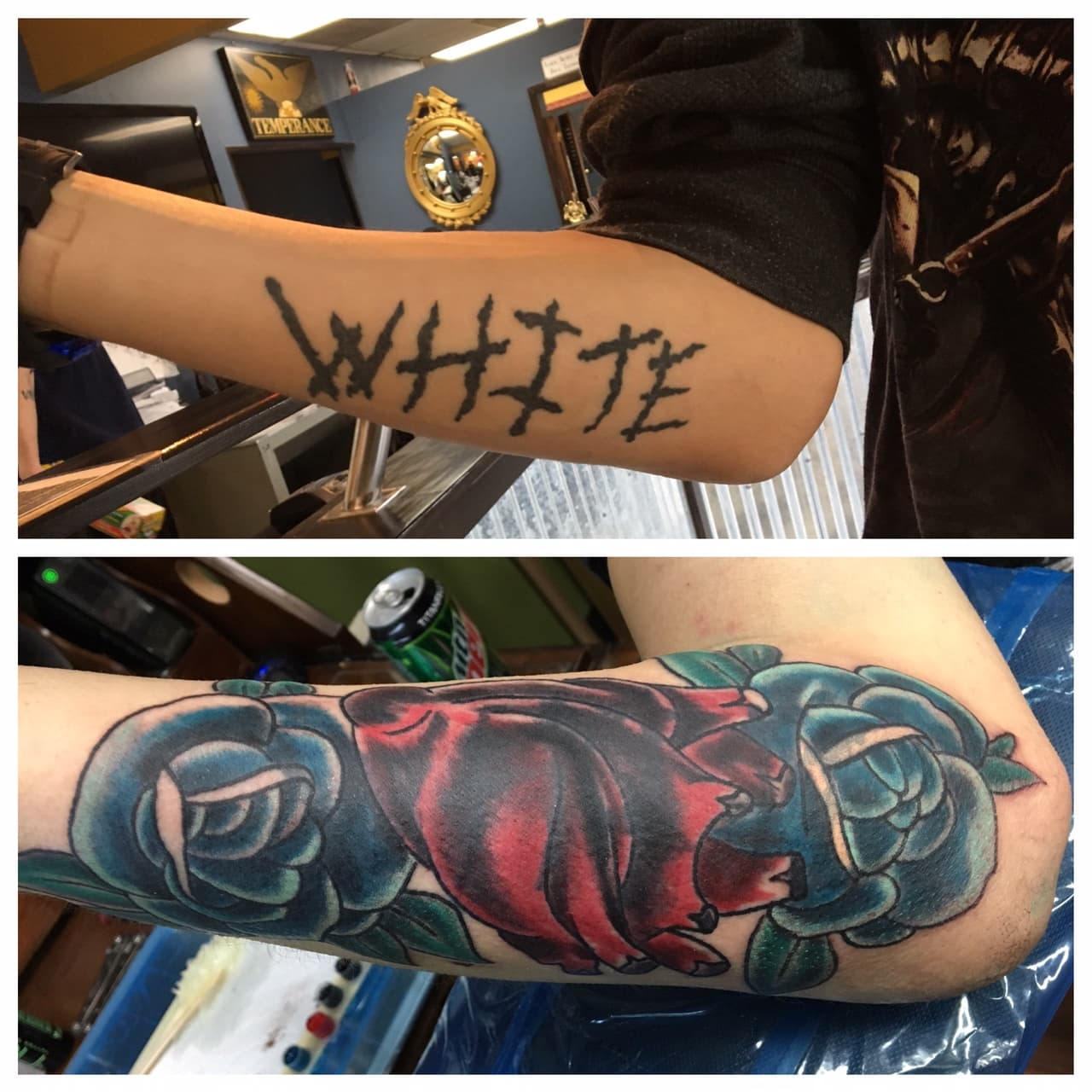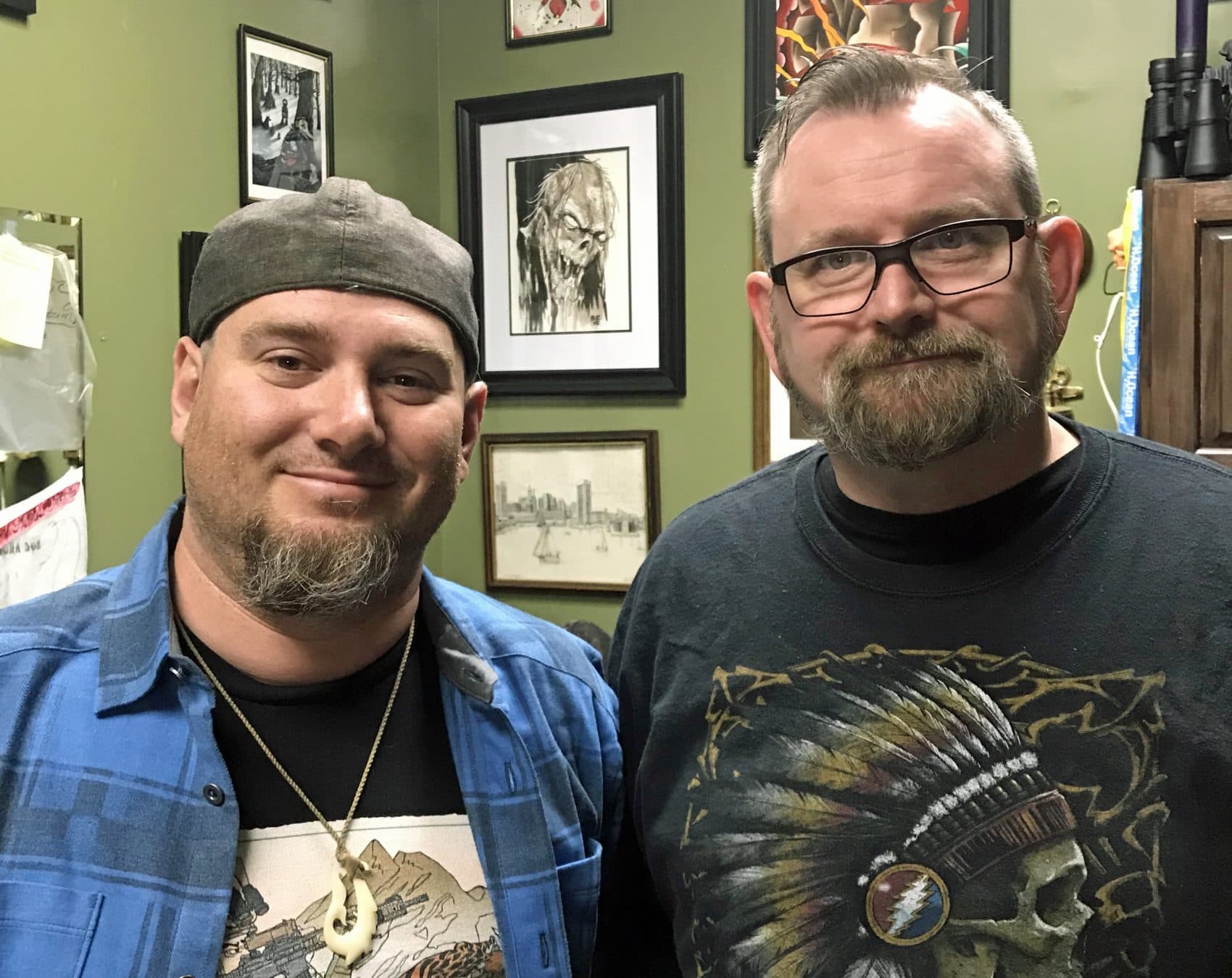Advertisement
New Ink
Resume
Recently, Dave Ente opened an email with a picture of a tattoo he’ll never forget.
“It was a portrait of Hitler, and now I mean it wasn’t just portrait of Hitler, like his face on somebody’s body. It was Hitler in a field with clouds and the sun and birds, that was nearly a guy's entire back.”
Over the past year, Dave Ente and his friend Dave Cutlip, a tattoo artist in Brooklyn Park, Maryland, have seen lots of tattoos like that: everything from a Hello Kitty swastika to a Confederate flag with a noose. They don’t like looking at them, but it’s part of a project that’s become central in their lives.
The whole thing started when a man walked into Dave Cutlip’s shop, Southside Tattoo, with a prison gang tattoo on his face. The man wanted to cover the tattoo with a new one.
“My wife turned around and looked at me, and she was like, ‘You can help people,’ ” he remembers. “And I basically said to her, ‘You want me to tattoo for free, don't you?’ She actually didn't say anything, but she gave me that look, and I know that look.”
That night, they posted on Facebook that anyone with a gang-related or racist tattoo could come and have it covered for free. Messages started pouring in; Dave says he’d gotten hundreds by the next morning and is still getting them, from MS-13 to Latin Kings, former skinheads and Klan members. Some had gotten tattoos in prison for protection. They said they wanted to move on from their past.
So Dave recruited his friend Dave Ente to help him manage the undertaking. (Since they’re both named Dave, Dave Ente, who's a diving instructor, goes by Diver Dave.)
Diver Dave followed up on the emails, which they started calling "redemption requests," and he did research to decide how genuine the remorse was in each case. The work felt personal to him.
“Being a Jewish person, I derive great pleasure out of eradicating the world of swastikas one at a time,” Diver Dave says. “A whole section of my family were killed in the Holocaust. Being able to be part of seeing people get over that kind of hatred, especially a hatred that is very much directed at me, it means a lot to me, and I think it’s very important work for us to be doing.”

Not everyone thinks this is a good idea. Some were angry that Dave would cover these symbols on the bodies of people whose racist views might be more than skin deep. Diver Dave says all he can do is trust the vetting that he does.
“I have to believe that people are able to change,” Diver Dave says. “Because if you're saying no one has the free will to be able to change their thought process, what kind of a world are we living in, and what kind of a world will we have?"
Change isn’t easy. Dave remembers a client who asked for a peace sign tattoo, and he told him, a simple peace sign won’t cover a swastika. Much like addressing racism, covering a tattoo is more complicated than getting the original. You need texture, lines and dark shaded areas to make it work. It takes time, and it’s painful.
“We could also just black ‘em all out with black squares,” Diver Dave says, “but that isn't helping with the rebirth and with the growth.”
Instead, Dave designs new tattoos for each client based on who they are becoming, turning gang signs into roses and birds.
While Dave works on their skin, people open up, and he hears their life stories. Stories like Lou’s.
Lou had a dark childhood, and early on, he says, he got into drugs of all kinds.
"Anything I could get my hands on," Lou says. "At that time I was just trying to feel numb from the world. I didn't care if I died or anything."
He had a lot of anger and self-hatred. He got into skinhead culture, and he says the people he met helped him get off drugs and made him feel accepted. They also channeled his anger toward people who weren’t white.
Lou gave himself his first white power tattoo when he was 13 or 14, but by the time he was 21, Lou says he was questioning the group’s violence and racism.
"I met a couple people, when I was by myself, of different races, and they started being friendly with me. You start to realize not everybody’s bad, and it doesn’t matter what color they are. It’s something I don't want to be a part of no more."
So, he says, he left. He asked us not to use his last name because he’s scared of retribution from the group he was a part of.
"I just fell off the face of the map. I stopped all social media, I changed my numbers, I moved far away," Lou says. "I still for the rest of my life will be a walking target."
He says leaving was hard.
"The only group I had was my skinhead friends. So when I got out of that, I had nobody," he says.
Six years later, Lou walked into Dave’s shop with nine tattoos on his body that he says he didn't believe in anymore. In one, a skinhead stick figure was stomping on a black stick figure.
Lou was nervous, but Dave didn’t seem to judge him when they talked.
Dave has covered about half of the tattoos so far and sees relief in Lou’s eyes each time. He and Diver Dave genuinely believe Lou has changed, that they’re getting to know someone who’s finding himself.
One time, Lou mentioned that he didn’t have any friends.
"We both were like, 'We’ll be your friend,' " Dave remembers. Lou says it made him feel like he wasn't alone anymore.

"Every time I get a tattoo, it’s like putting my life back together, putting me back together," Lou says. "I just get happy over the stupid little things now, instead of getting angry over everything."
Lou says what Dave’s doing — accepting people who want to change — encourages them to leave racism behind.
Dave says he'll keep doing it until he can't tattoo anymore, even though, after a year of redemption requests and 65 tattoo cover-ups, the job hasn’t gotten easy.
"I see this stuff, I go, wow, the world is a darker place than I thought it was," Diver Dave says.
"I didn't realize how much hate was out there, because I'm seeing it from, I’ve got at least one case from every state in the union, and Europe and Asia; I had someone call me from as far away as Nepal. It's hard to say that it hasn't changed me, because it has to have, but it makes me more determined to try to do my part to make the world a better place."
This episode includes music by Matt Reed and by Blue Dot Sessions (CC BY-NC 4.0).
This segment aired on March 1, 2018.
